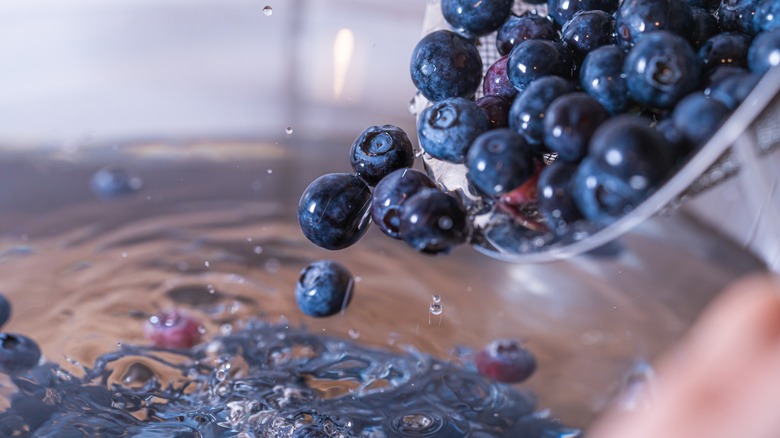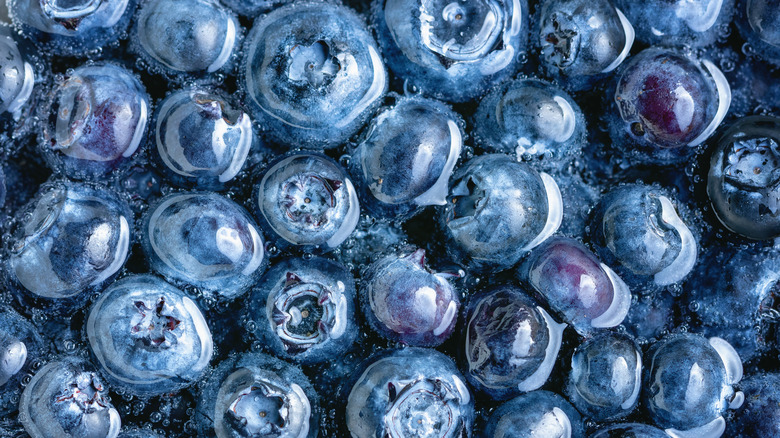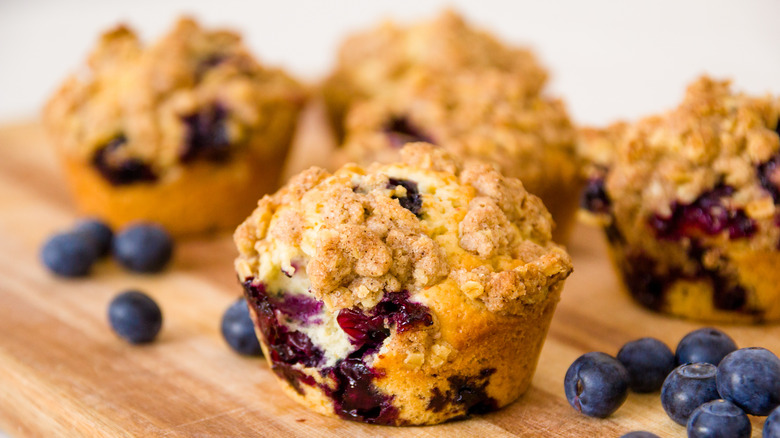The Water Hack That Tells You If Your Blueberries Will Be Sweet
Fresh blueberries are a delicious summer treat, but their appearance can be deceiving. In every handful of sweet and floral blue gems, you might find up berries that deliver a mouth-puckering sour explosion — and those tart suckers can look identical to their riper brethren. Even if you make every effort to choose the tastiest blueberries at the grocery store or a farmer's market stand, you're likely going to bring home a few duds.
The good news is that you can use a simple trick to separate sour berries from sweet ones, so can you chow down on the ripe stuff and repurpose tarter fruits in other ways. All you need is a big bowl of water. Pour your blueberries into the bowl and the plump, sweet ones should sink to the bottom, while the sour, underripe fruit bobs to the surface. This makes it easy to scoop out the less-desirable specimens with a strainer and save them for blueberry cakes, jams, parfaits with blueberry sauce, and other recipes that will mask their acidity with some sugar.
Keep this hack in mind every time you wash blueberries, and you'll make the sweetest fruit salads or blueberry granola bowls of your life, with no sour surprises. Feeling skeptical? This method may sound like a magic carnival trick, but you can learn how it works through some simple science.
Why ripe blueberries sink in water
Gravity and sugar are the factors at work in this hack. Blueberries become more dense as they ripen and their sugar content goes up. This gives them a higher specific gravity or relative density, terms used to describe the density of an object or substance in comparison to water. The riper the berry, the higher its specific gravity, causing it to sink in a bowl of water. Meanwhile, tart blueberries — which lack a lot of sugar — will float to the top, due to their lower relative density.
Some fruit-packaging companies are trying to take advantage of this phenomenon. There's a U.S. patent for a special machine that uses "hydrodynamic sorting" — essentially the float test on a larger scale — to help sort freshly-picked blueberries. Sweet berries would be swept away for processing, while unripe green and white ones are filtered out. You're unlikely to encounter a lot of green or white berries in the carton you bring home, but if some did sneak in, discard them, as they won't mature or ripen after picking.
As for mature but sour berries, make sure to dry them thoroughly before storing them in the fridge, if you don't plan to use them right away. Excess moisture encourages mold growth. Some berries will continue to ripen as the days go by, and you can keep track of their flavor by using the dunk test again. Once they sink, you'll know they've turned sweeter.
Baking up the sweet fruit
Bakers will love the float test as a shortcut to pick the sweetest berries, but these berries can pose a problem when making treats like blueberry corn muffins. The sugary, heavy fruits tend to sink through the batter and cluster at the bottom of the pan. Though you can't fight gravity, you can take some precautions to avoid muffins that only have fruit at the bottom.
Firstly, dry your blueberries thoroughly after washing them. Excess liquid left on the berries can prevent them from "gripping" the batter and staying in place. Many recipes advocate for tossing the berries with flour or cornstarch to stop them from sinking, but modern tests of this age-old method have revealed that it's not very effective. A better trick is to plop a layer of plain batter into your muffin or cake pan, then pour in the rest of the batter that has been mixed with blueberries.
This extra "cushion" of batter will slow the sinking effect, so your sweet bites of blueberries will be more evenly distributed. If your batter is very thin, you could also thicken it with extra ingredients like yogurt or instant vanilla pudding mix, so it holds the berries in place a little better. And if you don't want to alter your recipe, you know that sour berries are less likely to sink — you just might have to add more sugar to compensate.



